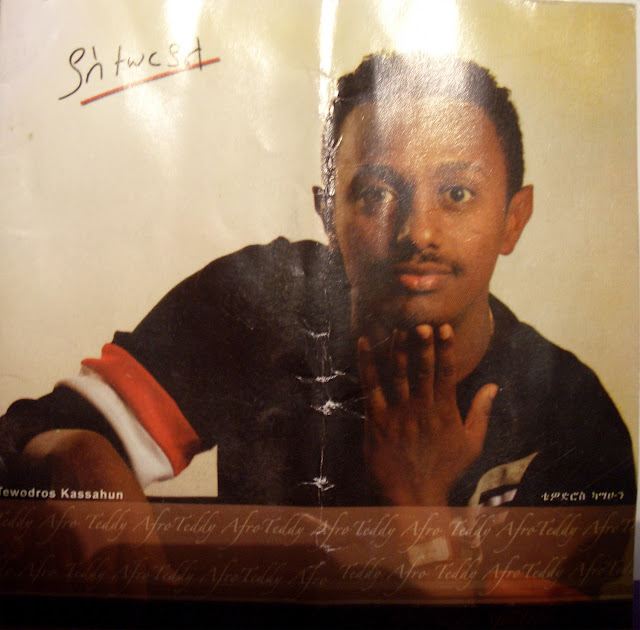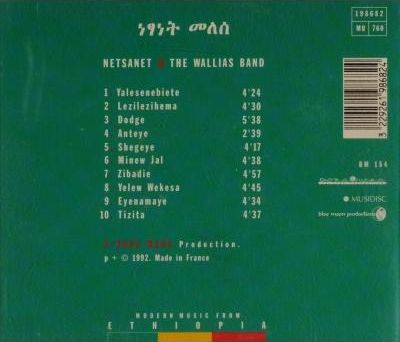R E U P L O A D
Born in Addis Ababa, Ethiopia, Abiyou Solomon began his love affair with the guitar when he watched his older brother tinker with the instrument around the house. At age 14, his brother bought him his first acoustic guitar and, soon after, he started playing at St. Francesco Theology College. While in high school he joined the Medhane Alem school band and, in his senior year, he played with the Alazarist Mission school band.

It was Genene Nebebe who recruited Abiyou to join the Genet Hotel Band. He next joined the Zambezi Club band and after a short period with them, he joined the Hotel D’Afrique band, led by Genene. He later joined the second incarnation of the Dahlak Band. In 1982, he joined the Hager Fikir Theatre Band and it was then that he first fell truly in love with the varied cultural music of Ethiopia. Also during this period, Abiyou had the pleasure to play with Abebe Kassa (alto saxophone) and Negusse Assefa (tenor saxophone). He would be reunited with Negusse when they formed the Abyssinia Band.
During his stint at the Hager Fikir Theatre, famed Ethiopian producer and arranger, Abegasu Shiota, persuaded Abiyou to switch to the bass guitar and he was soon asked to join the Ethio Stars band as a bass player, a post he eventually left to become a studio musician/arranger. In this role, he was involved in the production of 150+ recordings, working with a multitude of famous traditional and contemporary musicians, including Bahru Kegne, Yirga Dubale, Assnaketch Werku, Lemma Gebrehiwot, Abebe Tessema, Theodros Tadesse, Tsegaye Eshetu, Teshome Assegid, Kuku Sebsibe, Wubshet Fisseha, Martha Ashagari, Setegn Atanaw and many more.

In 1991, Abiyou joined the Abyssinia Band as a bassist. Their first gig was on the 1991 Ethiopian New Year. The following year, the band recorded five tracks for a Swedish compilation CD, Music from Ethiopia. The CD’s success in Sweden led to a tour of country, along with a performance at Etnosoi in Finland. Abiyou Solomon and The Abyssinia Band were also featured in the book, Rough Guide to World Music Volume One: Africa, Europe & the Middle East.
After the Abyssinia Band disbanded, Abiyou returned to being a session bassist until he moved to the United States in 1995, when he became a sought-after tour bassist. In that capacity, he has backed Mahmoud Ahmed, Aster Aweke, Theodros Tadesse, Hamelmal Abate, Tsehaye Yohannes, Neway Debebe and countless others. Apart from this album, Abiyou has released an Ethiopian Instrumental CD titled Abiy, and he produced and arranged Maritu Legesse’s Yebati Nigest. Currently, Abiyou resides in Addis Ababa, Ethiopia and is reforming the Abyssinia band.
Abiyou Solomon’s new CD, “In Search of my Roots” showcases Ethiopian/world music and shows how this music has carried into the 21st century while retaining it’s traditional roots.
Many instruments can be heard on this CD, along with Ethiopian singing and vocal styles. Abiyou Solomon was born in Addis Ababa. He began getting interested in the guitar by watching his older brother play around the house. His brother later bought him his first acoustic,which he started playing at St. Francesco Theology College. He later joined the Genet Hotel band.
In 1982, he joined the Hager Fikir Theatre Band. During his stint there,famous Ethiopian producer Abegasu Shiota convinced him to switch to electric bass guitar. He became an in-demand session bassist in America after this decision.
“Erikum Wello” has a repetitive quality that is hypnotizing.The vocals and the sound effects used are very different. The instruments used on this track are what the listener focuses on. You can hear drums and traditional sounds,along with horns.
“Hasa Konso” has an early ‘70s funk sound. The tone of the electric bass really sticks out on this track.There is an auto-wah effect that is being used on the synth that is cool. Basically,there are many great sound effects used throughout this album with great musicianship.
“Ethiopia 2000” is another funky track. Musicians should listen to CDs such as this to get ideas for creating original music. All the music here is original -- great horns, solid bass tones,and tons of traditional instruments.
Overall, Abiyou Solomon’s “ In search of my roots” retains the true sounds of traditional Ethiopian and world music with wonderful musicianship.



































